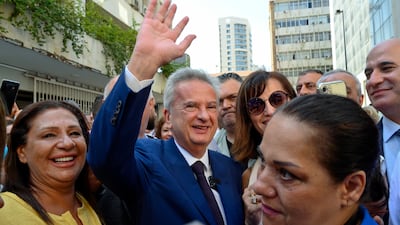The US, Canada and the UK issued sanctions against the former governor of Lebanon's central bank, Riad Salameh, and his close associates on Thursday.
Mr Salameh, who left office on July 31 after three decades in the job, is wanted by France and Germany and reviled by many at home after years of financial meltdown.
The French-Lebanese citizen, 73, is widely viewed as a key culprit in the country's economic crash, which the World Bank has called one of the worst in recent history.
He is under scrutiny in several domestic and international investigations for the alleged embezzlement of $330 million from Lebanon's central bank funnelled into properties across Europe and the UK, where more than $130 million worth of assets associated with him have been frozen.
Mr Salameh has repeatedly denied the allegations and any wrongdoing and defended his legacy at the bank.
On Thursday, three countries took steps against Mr Salameh and his associates.
The US Treasury’s Office of Foreign Assets Control has placed him on the Specially Designated Nationals and Blocked Persons List. The US Treasury said that Mr Salameh's “corrupt and unlawful actions have contributed to the breakdown of the rule of law in Lebanon”.

“By using his position to enrich himself, his family, and his associates in apparent contravention of Lebanese law, Salameh contributed to Lebanon’s endemic corruption and perpetuated the perception that elites in Lebanon need not abide by the same rules that apply to all Lebanese people,” said Brian Nelson, undersecretary of the Treasury for terrorism and financial intelligence, in the notice posted on the US Treasury Department website.
Mr Salameh's former aid, Marianne Hoayek, his son Nady Salameh, his brother Raja Salameh, and his romantic partner Anna Kosakova have also been sanctioned.
Ms Hoayek and Mr Kosakova have been placed under formal investigation in France for organised money laundering.
Nady Salameh was one of the directors of several companies registered in Luxembourg that have made multimillion-pound acquisitions in the UK, Germany, Belgium.
The National previously reported on properties valued at more than $4.5 million in the US tied to Raja Salameh.
“This means that these assets, as well as any other movable or immovable assets in the US linked to the sanctioned individual, are now seized,” said Facti panellist and international lawyer Karim Daher.
OFAC sanctions ban people from entering into US dollar transactions.
“This signifies that no international bank would risk maintaining financial ties with Riad Salameh and his associates,: Mr Daher added.
“This could potentially extend to individuals close to them but not under sanctions, as they might act as possible frontpersons and facilitate transfers on their behalf.”

The lawyer also noted that this could present an opportunity for the US, which had until now abstained from initiating any legal measures, to collaborate with the European judiciary.
France, Luxembourg, Germany, Belgium, Lichtenstein and Switzerland have been working on the case since 2021, backed by the European Union Agency for Criminal Justice Co-operation, to untangle the complex network of holdings, accounts and properties linked to Mr Salameh.
“The US co-operation could allow the tracing of financial operations made in dollars dating back a decade, resulting in a more comprehensive understanding of the financial movements,” Mr Daher said.
UK and Canada ramp up pressure
Canada and the UK have also announced sanctions against Mr Salameh.
In March 2022, £36.5 million worth of real estate assets tied to the Salameh family were seized in the UK on the request of the French judiciary.
“Riad Salameh and his close associates have stolen from the people of Lebanon and deprived them of resources crucial to its economic and social stability,” wrote Lord Tariq Ahmad, UK Minister of State.
The Office of the Minister of Foreign Affairs said in a press release: “These individuals are being listed for their involvement in acts of significant corruption, including the misappropriation of public assets for personal gain and the transfer of the proceeds of corruption to foreign states.”
The line-up of sanctioned associates differs slightly between countries, with Canada's list including Raja Salameh and Ms Hoayek, while the UK also encompassing his partner Ms Kosakova.
Momentum for the Lebanese judiciary?
In 2021, a separate investigation was opened in Lebanon that led to charges being pressed against Mr Salameh, his brother and Ms Hoayek in February after an 18-month inquiry.
“This is going to intensify the pressure on the ongoing Lebanese investigation,” Mr Daher said.
The file was transferred in February to Judge Charbel Abou Samra, with limited progress so far.
“This confirms Mr Salameh's involvement in various cases where he prioritised personal gain over the public interests,” said Lebanese opposition MP Mark Daou.
He said this could provide momentum for the Lebanese judiciary.
“While Mr Salameh remains under substantial protection in Lebanon, the increased international pressure is crucial to ensure his accountability on Lebanese soil, where the funds were misappropriated.”
He mentioned that there have been indications of positive movement within the justice system, with a recent request for Mr Salameh's arrest by a Lebanese judge.
“I urgently appeal to the Lebanese judiciary to act swiftly and effectively, ensuring that justice is served within Lebanon,” he added.
It is alleged that the governor funnelled public funds through commissions paid to his brother’s company, Forry Associates Ltd, under an irregular agreement with Lebanon's central bank from 2002 and 2016.
During this time, Forry would collect a 0.38 per cent commission from commercial banks, without them knowing and without providing any services in return, each time they bought financial instruments from the central bank.
Suspicions grew to the point that France and Germany issued an arrest warrant for alleged financial crimes, with Interpol issuing red notices for Mr Salameh. Lebanon, however, does not extradite its citizens.

